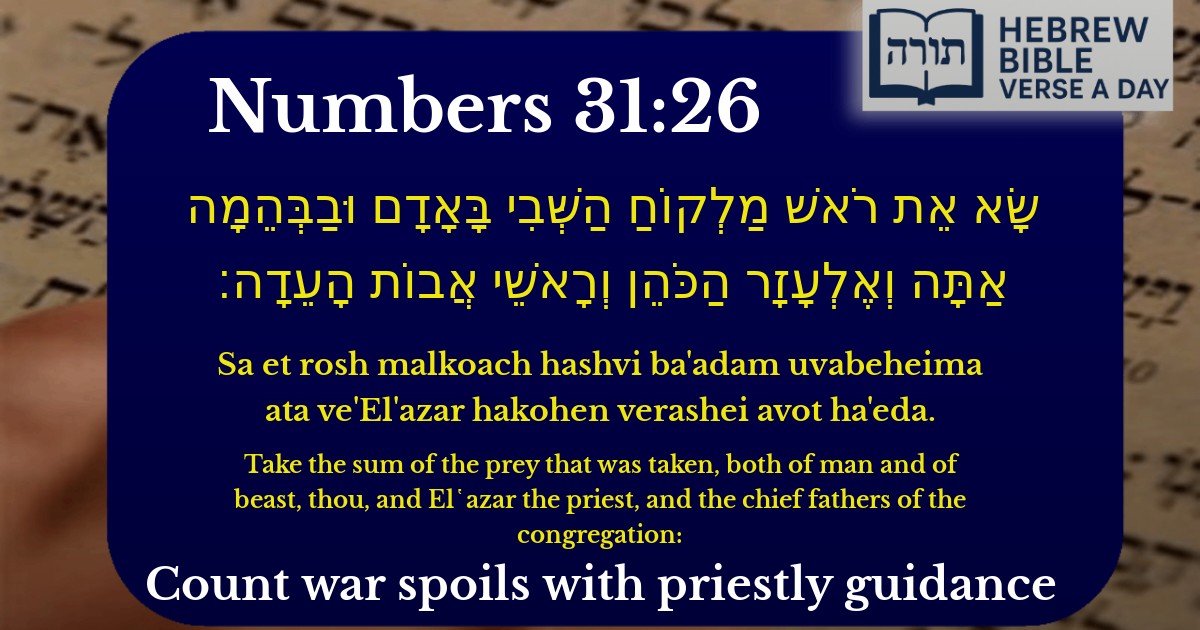Frequently Asked Questions
Q: What does Numbers 31:26 mean?
A: Numbers 31:26 instructs Moshe (Moses), Elazar the Kohen (priest), and the leaders of the congregation to take an account of the spoils of war—both people and animals—captured from the Midianites. This was part of the process of dividing the spoils according to Hashem's command, ensuring fairness and sanctity in their distribution (Rashi, Bamidbar 31:26).
Q: Why was Elazar the Kohen involved in counting the spoils?
A: Elazar the Kohen was involved because the spoils needed to be purified and sanctified according to Torah law. As the spiritual leader, he ensured that the division followed halachic (Jewish legal) guidelines, especially regarding items that would later be used in service to Hashem or given to the Mishkan (Tabernacle) (Rambam, Hilchot Me'ilah 8:6).
Q: What lesson can we learn from this verse today?
A: This verse teaches the importance of integrity and accountability, especially when handling communal property. Even in times of war or gain, Jewish leaders must act with transparency and follow Torah guidelines to avoid greed or injustice (Midrash Tanchuma, Matot 3).
Q: Why were the 'chief fathers of the congregation' included in this task?
A: The leaders of each tribe were included to represent their communities and ensure fairness in the distribution. Their presence guaranteed that no tribe would feel disadvantaged and that the process was conducted with communal trust (Sifrei Bamidbar 157).
Q: How does this verse relate to the laws of kosher spoils of war?
A: This verse introduces the concept that spoils of war must be handled according to Torah law. For example, non-kosher animals or forbidden items (like idols) could not be taken as personal spoils. The counting and division ensured only permissible possessions were retained (Chizkuni, Bamidbar 31:26).


Context of the Verse
This verse (Bamidbar 31:26) appears in the context of the war against Midian, where Moshe is instructed to take an accounting of the spoils captured—both human captives and animals. The command is directed to Moshe, Elazar the Kohen Gadol, and the leaders of the tribes.
Rashi's Commentary
Rashi explains that the phrase "שָׂא אֵת רֹאשׁ" (literally "lift the head") means to take a count or census of the spoils. He notes that this language is used elsewhere in the Torah (e.g., Shemot 30:12) to denote counting, emphasizing that the spoils were to be meticulously accounted for before distribution.
Role of Elazar and the Tribal Leaders
The inclusion of Elazar the Kohen and the tribal leaders highlights the importance of proper oversight in dividing war spoils. The Ramban (Nachmanides) explains that Elazar's presence ensured the spoils were handled with kedushah (holiness), as some would later be consecrated to Hashem. The tribal leaders represented the entire nation, ensuring fairness in distribution.
Halachic Implications
Midrashic Insight
The Midrash Tanchuma connects this counting to the broader theme of accountability in leadership. Just as Moshe and Elazar were responsible for the spoils, leaders must always act with transparency, especially when handling communal property.